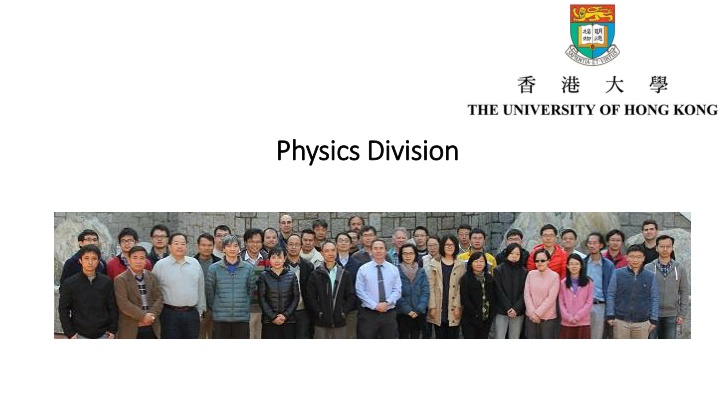
Highly Productive Physics Division with Strong Research Groups
A small yet highly productive physics division produces around 200 publications annually, excelling in quantum matter, quantum materials, astronomy, and astrophysics. The department has received numerous accolades and boasts research groups focusing on astronomy, astrophysics, experimental condensed matter physics, theoretical condensed matter physics, quantum information science, optics, photonics, nuclear and particle physics. MPhil and PhD programs are also offered, attracting approximately 15 students each year.
Download Presentation

Please find below an Image/Link to download the presentation.
The content on the website is provided AS IS for your information and personal use only. It may not be sold, licensed, or shared on other websites without obtaining consent from the author. If you encounter any issues during the download, it is possible that the publisher has removed the file from their server.
You are allowed to download the files provided on this website for personal or commercial use, subject to the condition that they are used lawfully. All files are the property of their respective owners.
The content on the website is provided AS IS for your information and personal use only. It may not be sold, licensed, or shared on other websites without obtaining consent from the author.
E N D
Presentation Transcript
Physics Division Physics Division
A small but productive unit (~200 publications annually) - e.g., in 2017, the department produced 270 papers, among which, 14 were listed by the Web of Sciences as the top 1% highly cited papers, and 4as the top 0.1% cited hot papers. Strong in research in certain areas, e.g., on quantum matter and quantum materials (2D and topological materials in particular), as well as astronomy and astrophysics, including, 7 in Science, 35in Nature and Nat. series, 45 in PRL over the past 5 years 2 papers on 2DM [PRL 108, 196802 (2012); Nat. Nano. 7, 490 (2012)], each received ~2000 citations Recognitions: - 6 National Natural Science Awards - 8 Croucher Senior Research Fellowship/Innovation Awards - 11 DRAA/ORA/OYRA
Research groups Research groups Astronomy and Astrophysics Group Q.A. Parker, J.J.L. Lim, M.H. Lee, M. Su, S.C.Y. Ng, Jane. L.X. Dai
Research groups Research groups Experimental Condensed Matter Physics M.H. Xie, X.D. Cui, A.B. Djuri i , S.J. Xu, D.K. Ki, F.C.C. Ling Theoretical Condensed Matter Physics Z.D. Wang, S.Q. Shen, W. Yao, S.Z. Zhang, Z.Y. Meng, C.J. Wang
Quantum Information Science group: H.F. Chau, H.K. Lo, Z.D. Wang, S. Z. Zhang
Optics and Photonics group: Optics and Photonics group: A.B. Djuri i , T.T. Luu, , S.J. Xu,, S. Zhang
Research groups Research groups Experimental Nuclear and Particle Physics J.H.C. Lee, Y.J. Tu Atomic, Optical and Quantum Physics Z.D. Wang, H.F. Chau, S.Z. Zhang, T.T. LUU, S. Zhang, H.K. Lo
MPhil and PhD Programs MPhil: Duration: 2 years Registration: Sep. 1 or Jan 1, each year PhD: Duration: 3~4 years Registration: 1st of each month In total, about 15 students each year
MPhil and PhD Programs MPhil - a Bachelor's degree with honours (or equivalent qualification) from a recognized university. PhD - a Bachelor's degree with honours and a Master's degree (or equivalent qualification) from a recognized university; or - a Bachelor's degree with first class honours (or equivalent qualification) from a recognized university. English requirement - TOEFL: overall score of 80 or above, or - IETLS: band 6 with no subtest lower than 5.5 Deadlines (20/21) Main round (Sep. 1 Dec.2), first clearing round (Dec. 3 Apr. 30), second clearing round (May 1 Aug. 31) More details can be found at https://www.gradsch.hku.hk/gradsch/prospective-students/how-to-apply and https://www.physics.hku.hk/prospective-students/rpg-admission


